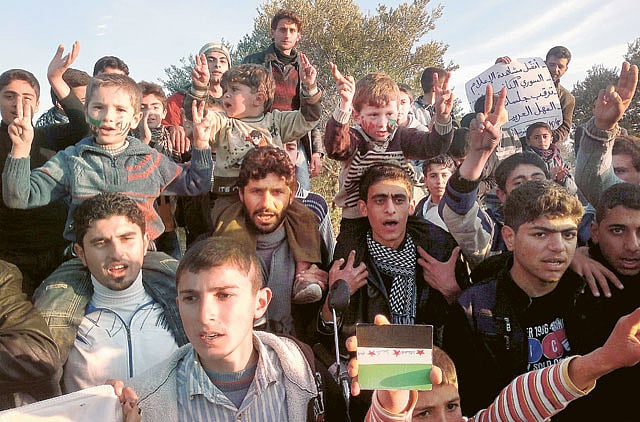Akkar, Lebanon: As Major Haitham Mahameed prepared to return to Syria from his hiding place in Lebanon and fight for the overthrow of President Bashar Al Assad's regime, his wife called him repeatedly on his mobile phone.
Mahameed's wife, who is still inside Syria, wasn't calling to urge him to fight for freedom, or even to beg him to be careful. A member of the Alawite group that makes up Al Assad's hard core of support, she was calling her husband, a Sunni, to lambast the rebel movement he has joined and bemoan the fact that he had left his family.
"She calls me every two hours to tell me how awful it is that the protesters — the ‘terrorists', are killing the Alawite soldiers," said Major Mahameed.
An army defector aged 42, he has been married for 15 years. He fell in love with his wife instantly when he saw her on a bus, and wooed her at some risk to his safety — they had to marry in secret after members of her family were outraged when she fell for a Sunni. But true love conquered all, they had two children — a son, now 14, and a daughter, now 11.
Happy times
For years they lived happily in an Alawite neighbourhood in Homs. Then in March, as the Arab Spring swept across the region, the Syrian uprising began in their own town, which has since suffered more than any other in the country.
As it took hold, their religious differences started to matter, and then began to tear their marriage apart. Now he fears that he may never see his family again, at least not as a loving husband and father.
"My wife, she loves the army and she loves Al Assad. She watches the state television and becomes saddened by the soldiers and state securitymen being killed every day," he said, at a small house in Akkar, near the Syrian border, one of a string of small towns that have become a refuge and gathering point for men like himself.
Major Mahameed recalls: "Every time I returned home I explained what was happening at the checkpoints. I said it was a sin that the Shabiha [regime thugs] killed protesters. But she doesn't understand what the Shabiha are. She wouldn't agree with me, she would become confused and say she is just against killing." As the violence against protesters escalated, the major was faced with a choice; follow orders to fire on civilians, or be killed.
So he escaped, defecting to join the Free Syrian Army, an armed insurgency seeking to wage war on the regime. His wife, convinced that the rebels were terrorists, would not follow. "I tried to bring my wife and two children with me to Lebanon. I said to my wife ‘I am so sorry, I can't live like this. Please come with me'. But she would not come. ‘We are safer here,' she told me.''
Sickening violence
Describing the incident that convinced him the time had come to leave. Major Mahameed said: "There was a woman crossing the road coming towards the checkpoint, wearing a hijab. They didn't ask her where she was going, they just shot her." As if that were not enough, Shabiha on the checkpoint then pounded the dead woman's neck with guns until they separated the head, which they put into a plastic bag. "But all she had been doing was shopping with her son," he recalls.
His hope is that large-scale defections will bring down the regime. Every day more ex-soldiers risk the journey across the border into Lebanon to join the Free Syrian Army.
As Major Mahameed spoke, in a darkened room thick with cigarette smoke, three new recruits arrived, still breathless but elated that they had escaped from Syria — all of them armed and willing to go back in an opposition army.
Major Mahameed is determined to continue the struggle and fight — even though he knows that continuing down this path could mean civil war for the whole country. And that in turn may mean losing his family for ever. "I feel that I have lost them, and I fear for them, and for this I cry every day," he said.
— The Telegraph Group Limited, London 2012
Sign up for the Daily Briefing
Get the latest news and updates straight to your inbox
Network Links
GN StoreDownload our app
© Al Nisr Publishing LLC 2025. All rights reserved.
